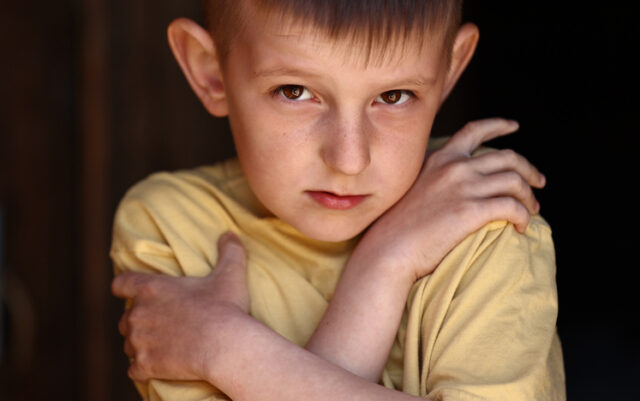Your parents are supposed to be there to support and guide you, but not all kids are lucky enough to experience this.

If you grew up in a verbally abusive household, you were undoubtedly on the receiving end of insults, harsh criticisms, and inappropriate comments that left some pretty intense scars. As a result, you may experience these things as an adult.
1. Your self-esteem and confidence levels are on the floor.

Constant criticism and put-downs during childhood can lead to deeply ingrained self-doubt. You may end up questioning your abilities and worth, even in areas where you know you excel. Building and maintaining confidence becomes an ongoing challenge, requiring conscious effort to overcome negative self-talk.
2. You find it nearly impossible to trust anyone.

When a parent, who should provide love and support, is verbally abusive, it can shatter your ability to trust. You end up always being on guard, expecting criticism or betrayal from everyone in your life. The constant wariness can make it hard to form close, meaningful relationships in adulthood.
3. You take even the slightest criticism very personally.

Years of verbal abuse can make you hyper-aware of any form of criticism, even when it’s constructive. You may react defensively to feedback or see innocent comments as attacks, and this sensitivity can make personal and professional relationships hard to deal with. After all, feedback is necessary for growth.
4. Setting boundaries isn’t your strong suit.

Growing up in an environment where your boundaries were consistently violated can make it hard to establish and maintain healthy ones as an adult. You might end up being too accommodating, scared of conflict, or being overly rigid in your relationships.
5. You have serious people-pleasing tendencies.

To avoid conflict or criticism, you might develop a strong desire to please everyone at the expense of your own needs and desires. Of course, this can lead to burnout and resentment because you’re consistently prioritising everyone else’s happiness over your own mental, emotional, and even physical health and well-being.
6. You get extremely anxious in social situations.

The fear of judgement instilled by verbal abuse can manifest as social anxiety. You might feel uncomfortable in big groups because you’re worried about saying the wrong thing or being criticised. The sad thing is that your anxiety can keep you from socialising and limit your opportunities for connection.
7. You don’t know how to express your feelings (and hate doing it).

In a verbally abusive environment, expressing feelings often leads to further abuse. As a result, you might struggle to identify and express your feelings as an adult. Of course, bottling everything up not only leads to trouble in relationships, but it can also be overwhelming for you since you’re shouldering the weight of the world. You can only do that for so long before you inevitably explode.
8. Your self-talk is incredibly negative.

The critical voice of an abusive parent can become internalised, leading to constant negative self-talk. You may end up mentally berating yourself for small mistakes or so-called flaws, which then just perpetuates the cycle of verbal abuse internally. You wouldn’t speak to a friend like that, so why do you do it to yourself?
9. You have trust issues in romantic relationships.

The impact of verbal abuse can massively affect your romantic relationships. You can never bring yourself to trust your partner fully, largely because you’re always expecting criticism or abandonment. Jealousy, insecurity, and emotional distance are common themes in your relationships, which is sadly why they never last that long.
10. You struggle with perfectionism.

To avoid criticism, you might develop perfectionistic tendencies. The fear of making mistakes or not meeting impossibly high standards can lead to procrastination, anxiety, and a constant feeling of inadequacy. Your personal and professional growth inevitably suffer as a result.
11. You have analysis paralysis and struggle to make decisions.
 Source: Unsplash
Source: Unsplash Constant criticism during childhood can destroy your confidence in decision-making. As an adult, you might second-guess yourself all the time or struggle to make choices without getting advice and approval from other people. Needless to say, this has a negative impact on every area of your life.
12. You struggle with anger management.
 Source: Unsplash
Source: Unsplash Suppressed emotions from childhood verbal abuse can manifest as anger issues in adulthood. You might have an extremely short fuse or not know how to express frustration in healthy ways. Obviously, this can lead to conflicts in relationships and professional settings, too.
13. You have a fear of abandonment.

The emotional instability of growing up with a verbally abusive parent can lead to a deep-seated fear of abandonment. This fear might cause you to cling to unhealthy relationships or struggle with feelings of insecurity even in stable partnerships.
14. You struggle with imposter syndrome.

The constant undermining of your abilities during childhood can result in imposter syndrome as an adult. Despite your achievements, you might feel like a fraud, constantly worrying that you’ll be “found out” as not being good enough. This can hold you back from pursuing opportunities and fully embracing your successes.
15. You can’t accept a compliment to save your life.

After years of criticism, genuine compliments can feel uncomfortable or undeserved. You probably deflect any praise you receive and fail to internalise positive feedback. Not being able to accept compliments can reinforce negative self-perceptions and keep your self-esteem low, and that’s not good.
16. You don’t know how to advocate for yourself.

Growing up in an environment where your needs were dismissed or criticised can make it challenging to advocate for yourself as an adult. You might struggle to ask for what you need or deserve, whether in personal relationships or professional settings, often settling for less than you’re worth.
17. You have a tendency to self-sabotage.

The negative self-image instilled by verbal abuse can lead to self-sabotaging behaviours. You may unconsciously undermine your own success or happiness because you feel unworthy of good things in life. This can manifest in various ways, from procrastination to sabotaging relationships.
18. You don’t know how to regulate your emotions.

The chaotic emotional environment of verbal abuse can impact your ability to regulate emotions as an adult. You might become easily overwhelmed by strong feelings or struggle to maintain emotional balance in stressful situations. This can affect your relationships and overall health.
19. You don’t trust your own judgement most of the time.

Verbal abuse often involves gaslighting, which can lead to a persistent doubt in your own perceptions and memories. As an adult, you might second-guess your own experiences or struggle to trust your judgement, often needing external validation for your thoughts and feelings.
20. You have a complicated relationship with success.

Achieving success can bring up complex emotions for those who grew up with verbally abusive parents. You might feel undeserving of your accomplishments or anxiety about outperforming your parent, which can lead to conflicted feelings about personal and professional achievements, sometimes even subconsciously limiting your own success.




